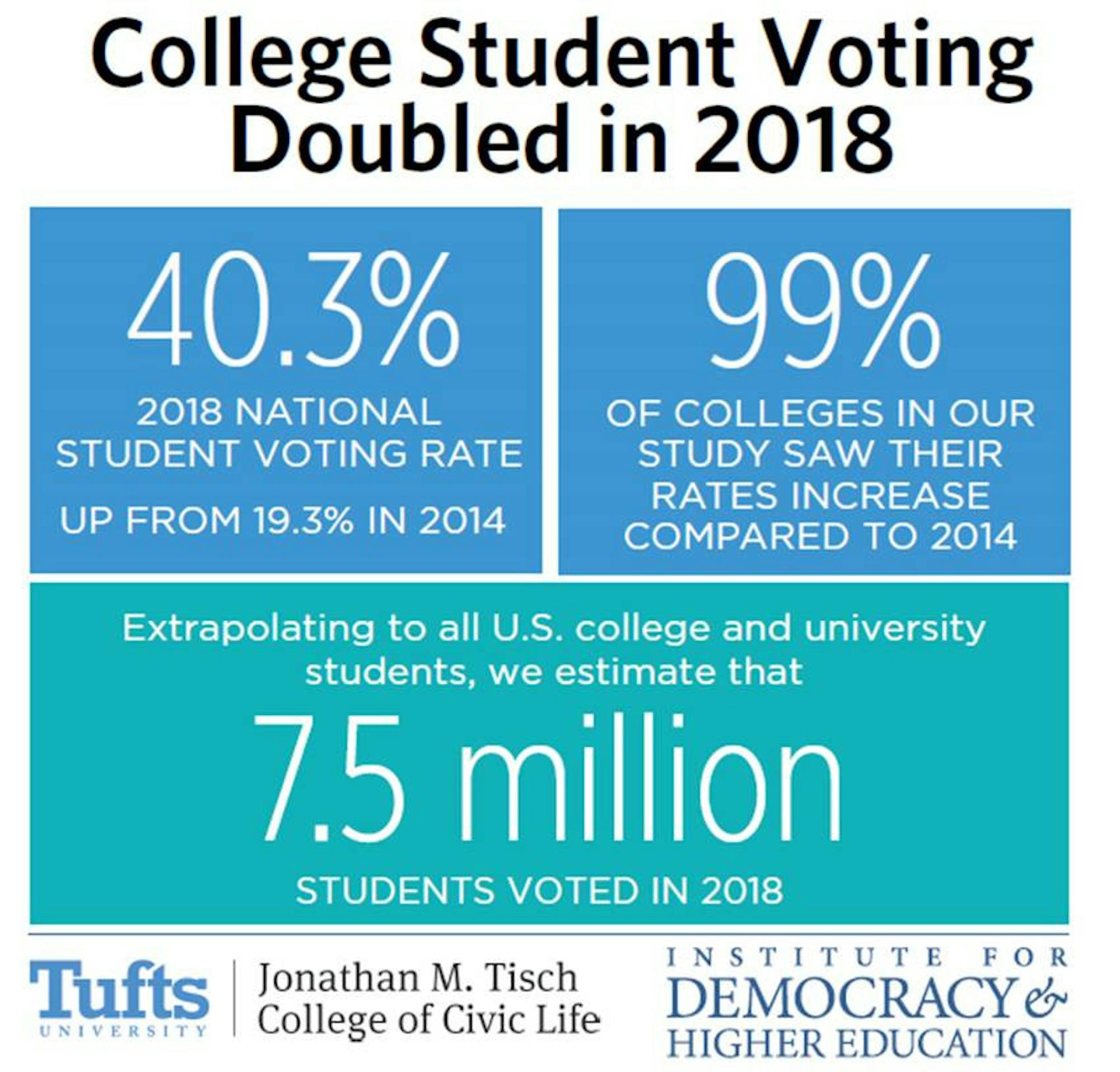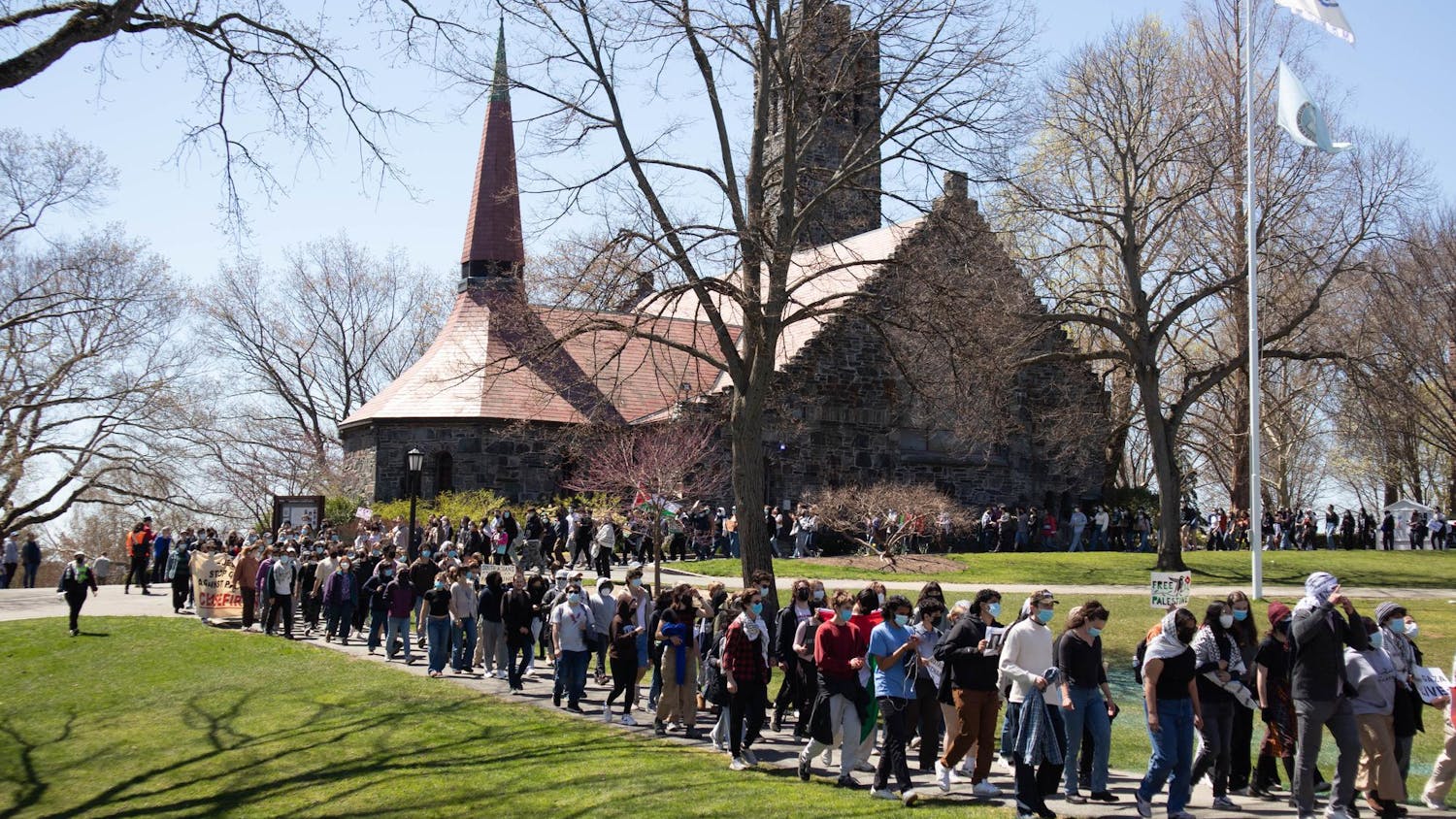The Institute for Democracy and Higher Education (IDHE), a research group run out of the Jonathan M. Tisch College of Civic Life,reported that college student voting rates jumped from 19.2% to 40.3% between the 2014 and 2018 midterm elections. Amassing data from 10 million students across over 1,000 institutions, all demographics witnessed a marked increase in civic participation.
The IDHE researchers received data cross-validated from multiple sources, David Brinker, the senior researcher at the IDHE, said in an interview with the Daily. Namely, the National Student Clearinghouse and Catalist establish voting profiles accounting for around 97% of college students at federally-subsidized universities. The data Tufts receives includes whether an individual voted, their voting method and geographical information; it does not include who the student voted for, Brinker said.
Brinker said his job includes looking for raw numerical data, such as voting rates, and then interpreting this data to find what Brinker calls "stories in the data."
“We are invested in the voting rate because of what it says about democracy and civic health," he said. "We’re honestly fairly ambivalent to the rate itself ... instead, what we jump up and down about is, did the gaps between different groups of students like economic classes, race, sex, field of study, get smaller?”
For instance, the Hispanic college student voting population jumped from 9.3% of the total votes in 2014 to 15.5% in 2018, according to data on the Tisch College website. Meanwhile, the Asian population only took up 3.0% in 2014 and attained only 4.4% in 2018.
Brinker also pointed out disparities in fields of study, citing particularly that STEM majors tend to participate far less often in elections than almost all other areas of study. Therefore, the IDHE aims to identify and lessen disparities found among demographics in voting data.
Jen McAndrew, the director of communications, strategy and planning for Tisch College, rejected what she called the popular notion that young people are not involved in politics, and she believes the data corroborates her belief.
"Young people are engaged in their communities, they care about issues, about each other, about getting more involved in voting," McAndrew said. "Young people are raising their voices on issues they care about and encouraging their peers to vote."
She cites recent student-led movements such as the March for Our Lives, the Global Climate Strikes and other local campaigns. Nancy Thomas, the director of IDHE, also believes in the power of students.
“I don’t subscribe to the theory that students are apathetic. If they are apathetic, then they are not getting the right education, and then universities need to stop and ask, ‘What are we doing wrong if our students are apathetic?’” Thomas said.
McAndrew also rejected what she said is the common notion that colleges tend to "liberalize" students.
Today, college students and young people are overwhelmingly liberal, a recent trend in American politics.McAndrew shared a chart that displays how voting trends among young people, not just college students, have varied since 1992.
She specifically pointed out how, as recently as 2002, there was almost an equal number of young Republican and Democrat voters. Today, this is far from the truth, with 67% of young voters leaning toward the Democratic Party.
McAndrew also said that nationally, climate change is a significant issue for both conservative and progressive students. However, the GOP has thus far failed to prioritize climate change as a substantial issue, according to McAndrew. She also believes that the GOP is in great danger of losing a whole generation, as Republicans are not reaching out to the younger generation and asking what issues they care about.
However, a large contingent of young people feel as though neither party represents their values and ideals, according to McAndrew.
The institutional campus is therefore uniquely situated to fill this role of platform, microphone and audience, Brinker said. Brinker believes the role of universities and colleges is to equip students with economic mobility as well as political mobility.
To McAndrew, the historical responsibility of universities is to educate citizens for democracy and civil participation regardless of partisanship. Thomas agreed with and expanded on McAndrew's sentiment.
“[Universities should] prepare students so that they’ve got the creative imagination and the skills to manage public affairs, so if you’re thinking of education as a function of society, the function of our educational system is to prepare our citizens for democracy,” Thomas said.
IDHE report indicates college student midterm voting doubled in 2018

Tisch College study shows increase in student voting





